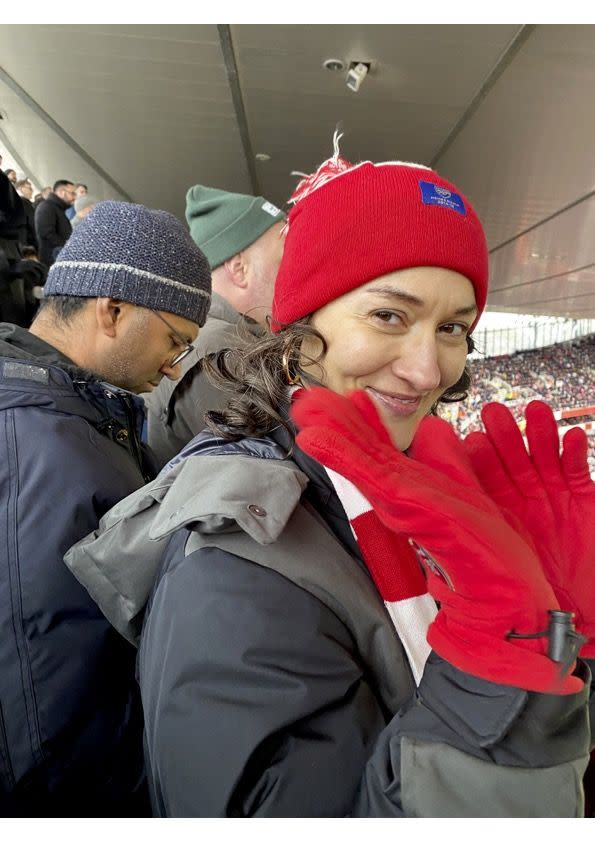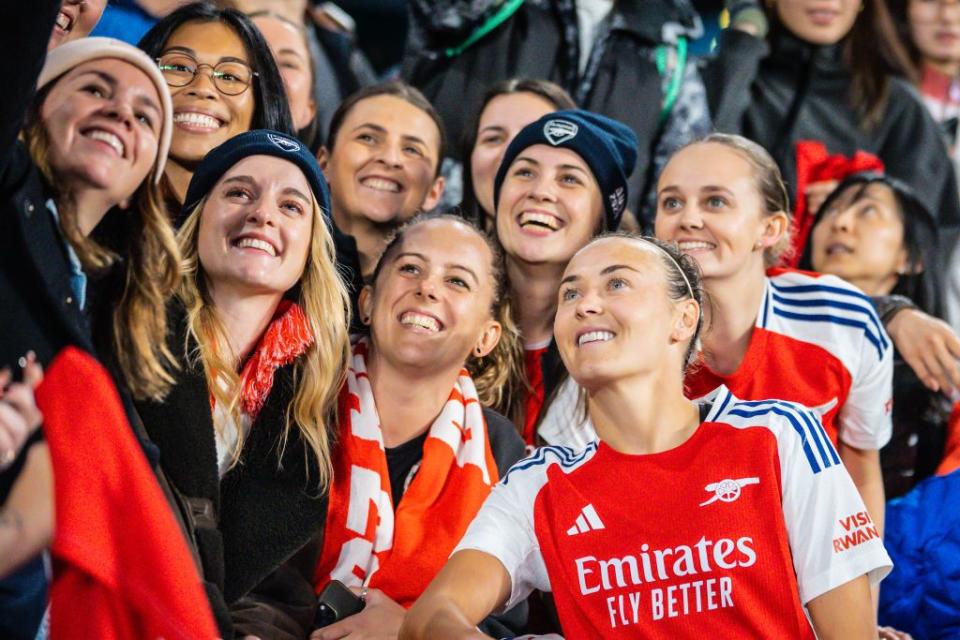Girls On Tour: The Fresh Thrill Of Female Football Fandom
Like many female football fans, I can trace my love of the beautiful game back to men - in my case, an ex-boyfriend and Thierry Henry.
I grew up near Highbury, Arsenal’s stadium until 2006. If someone asked, I would say I supported Arsenal but was largely indifferent to football as a child. That changed in the early Noughties when I started watching games at the pub with my Arsenal-supporting ex. This coincided with a golden era for the club. In 2004, we won the League unbeaten thanks to rakishly elegant genius Arsene Wenger in the dugout, and silky, sublime football on the pitch with players including Patrick Vieira, Freddie Ljungberg, Robert Pires, Dennis Bergkamp and The King, aka Henry. I was in love.

That was 20 years ago. I now attend around half of the men’s home games at the Emirates every season. Wrapped up in layers of red and white, I have experienced unbridled joy in North Bank, Block 99 - Henry’s 2012 comeback goal against Leeds keeping us in the FA Cup, three goals in 22 minutes in the North London Derby in 2021, that Reiss Nelson last minute winner against Bournemouth last year - and also some moments of deep connection. I remember the guy next to me once asking “how long does it take to get over a loss?” It was an IYKYK question - one only those of us ridiculous enough to become entirely invested in the fortunes of a football team can understand (the answer? Between 48 and 72 hours, and a lot of cat videos).
When I started supporting Arsenal in earnest, football fandom was very much a man’s game. Arguably, it still largely is. I am only one of two women in the immediate vicinity when I go to the Emirates (although I don’t know her name, we often say hello). But more and more women are discovering how absorbing football fandom can be. A study in 2023 found that the number of women interested in football had gone from 25% to 33% in three years. Even Anne Hathaway is on board - at a junket for The Idea of You in April, the actor came out as an Arsenal fan, celebrating Leandro Trossard’s goal against Chelsea with a familiar double fist pump.
Phoebe Luckhurst, Senior Commissioning Editor at The Sunday Times magazine, is also an fellow Arsenal fan. It’s the emotion that keeps her hooked. 'You feel so stressed sometimes, in a way I almost enjoy,' she says. 'There’s 11 men or women doing something [on the pitch] and you can’t effect what the result will be. It’s controlled jeopardy. Football does matter, but also in the grand scheme of things, no one's died.' (Although, I would argue, it can sometimes feel like it.)
Some women have made careers out their football obsession. Felicia Pennant, the former Features Editor at Matchesfashion, is founder of Season Zine, a publication dedicated to football and fashion (Mary Earps, the heroic England goalkeeper, was on the last cover). She has recently been appointed as the first ever editor of Soccer Bible. Pennant can testify to the power of fandom when it comes to connection - her support for Chelski (sorry) helped her through a difficult period. 'My parents were getting a divorce and football was a neutral topic with me and my Dad, that we could talk about, it was an escape.'
Women like me, Pennant and Luckhurst have more recently been joined by a newer cohort - thanks, in a large part, to the success of the Lionesses since 2017, and also a gradual makeover of footballers. David Beckham is no longer the exception. Players now are likely to be groomed, well-dressed and with the role model factor to put them on the radar of luxury brands. See, recently, players like Marcus Rashford and Bukayo Saka modelling for Burberry, Lionel Messi and Cristiano Ronaldo for Louis Vuitton or Declan Rice and Lioness Leah Williamson for Aime Leon Dore.
Since the success of the Lionesses, the profile of women’s league football has grown exponentially. The equivalent of the Premier League, the Women’s Super League (WSL), became fully professional in 2018, and the games have been broadcast on Sky Sports since 2021. This attention will increase again with the Olympics. Although Team GB did not qualify, women’s football is likely to be one of the must-watch team events in Paris thanks to stars like Spain’s Aitana Bonmati and The Netherlands’ Vivianne Miedema.
Arsenal have - of course - been leading the charge. According to The Guardian, they set the attendance record for a women’s game in 2023, and 42% of supporters at WSL games are female compared to 14% in the Premier League. 'My friend Ellie had never been particularly interested, and then she got really into the women's Euros a few years back,' says Luckhurst. 'Since then she’s the person I go to the women's games with, which is really lovely….[it’s been nice] seeing people discover a game that I have always loved so much.'
Amy Drucquer, the founder of the This Fan Girl Instagram platform, has seen the impact of the women’s game. She began the platform as a photography project in 2016, to document the then-largely invisible women watching football. 'At the Euros, you’d see the camera pan to a sexy woman, that's the absolute classic,' she says. 'So we just wanted to question that a bit. Eight years on, and she has expanded to include a WhatsApp group and brand content agency, working with female fans across the men’s and women’s game - but increasingly the latter. She says women’s football is where the momentum is: 'The women’s football fanbase is going to keep growing. It’s such a nice, fertile ground for new fans to come in.'
Flo Lloyd-Hughes is a broadcaster on women’s football who is a regular on Wrighty’s House, the podcast from the deity otherwise known as Ian Wright. She says this is is only the start. 'The next generation is going to be so different because it'll be women players that are building their relationship with football and women fans, [will] pass that on as well.'
While I applaud this development, I have never been to an Arsenal Women game. I change this on a windy April afternoon, when I watch Arsenal Women in a 3-0 victory over Leicester at the Emirates. The demographic is younger, more female, lots of kids with Mums or Dads - factors no doubt influenced by the lower ticket prices (around £12 for an adult, compared to the £46 I pay for a Premier League game) but the fandom is still very real. With around 40,000 fans, the noise is impressive, and familiar chants ring out. It’s just that at this game ‘come on you Gunners!’ is shouted by a 10-year-old girl in full kit (with socks) rather than a middle-aged man with a paunch.
The warm atmosphere is not a one off. Zoe Draper is the Chair at the Arsenal Women’s Supporters Club. She says it comes from a conscious effort to be welcoming. 'There are always opportunities to meet up with other fans,' she says 'which I think makes people less scared of coming. You hear amazing stories of people who've come to matches and found a partner, a friend, got a job.' It contrasts to her experience of men’s games. 'I went to matches with my parents when I was a kid back in Southampton but it can be quite intimidating…It is more inclusive [at women’s games], people of all sexualities are welcome to come to games.'

This is something that can be seen beyond the top flight. Dulwich Hamlet FC is a non-league club in South-East London. The Club’s General Manager, Mel Hughes, says the female contingent of the fanbase is notable, and families often come on Sundays for the women’s games. Like Draper, she says there is a desire to disrupt the idea of football as a man’s game - as with one of my favourite elements of football fandom: chants. 'Men's football is all generic chanting or fat-shaming the keeper. It’s quite bolshy. We like to be a bit more creative, a bit more fun and inclusive.'
The representation of the LGBTQI+ community in the women’s football fanbase is to be applauded - in March, Gay Times published an article entitled ‘How the Women’s Super League became the pinnacle of UK sapphic culture’. But it’s important to acknowledge that women’s football is not entirely an inclusive utopia. 'If you’re a white LGBTQ woman, it’s great for you,' says Pennant. 'I'm speaking as a Black woman. It's not always as inclusive as you think it is.'
Even with the recent rise of female fans, there remain spaces in football that might not be entirely welcoming. I have never been to an Arsenal away game, it’s always been on my bucket list. However, talking to these women has made me think twice. 'It's often a minority group within the fanbase that represent that misogynist side of the men's game,' says Lloyd-Hughes. 'Unfortunately, that’s just the crap bit of men's football culture that will continue to exist.' Perhaps, instead, I should think about a women’s away game. 'If we play up in Manchester [for example], we’ll arrange meet-ups with our fans, coordinate trains and have a plan,' says Draper.
This sense of community is perhaps also part of women discovering football fandom - it’s a valuable commodity in a world increasingly effected by loneliness. I have a much-loved message group with two friends that’s active most days with Arsenal chatter - in the moments after the game, it can often have 50-odd messages - but also takes in politics, managers at other clubs and the relative merits of Courtney Love. Pennant, meanwhile, has a group chat called Black Footy Babes full of that football fandom classic: bantz. 'A lot of [the members] are Arsenal fans and they come for me because I give it back,' she laughs. 'I’m like "win the Champions League and then come talk to me.”' (oh, I am sure they will.) Lloyd-Hughes, who supports QPR, has joined a LGBTQI+ focused fan group. 'Realising there are lots of people who have similar interests, care about the same sorts of things and want to experience football in similar ways, that [is really important].'
Systemarosa is a new female-focused platform for football culture, begun by Season alum Naomi Accardi and brand consultant San Herzog in 2023. It was partly shaped by Herzog’s own experiences growing up. 'The Premier League was extremely gatekept away from me, even within my own family,' she says. 'It was for my dad and my brother, and I wasn't really invited. And now as an adult, I'm finding that I love watching it… with Systemarosa, we’re saying, "there's space for you. We can join this culture in our own way."'
I ask every woman I speak to for this piece what it is that football fandom gives them. It’s Accardi, the daughter of a professional footballer, who nails the experience for me. 'I relate it to the same type of feeling that you feel if you’re religious. When you go to watch a game with a bunch of people that share the same faith for the team, there is this type of camaraderie and bonding and pure raw emotion that you do not feel in any other situation,' she says. 'You’re all there for a common goal, for your team to win. Nothing else matters.' I’ll be thinking of that next time I take my spot in Church - aka the North Bank - and forever more. COYG.
ELLE Collective is a new community of fashion, beauty and culture lovers. For access to exclusive content, events, inspiring advice from our Editors and industry experts, as well the opportunity to meet designers, thought-leaders and stylists, become a member today HERE.
You Might Also Like


